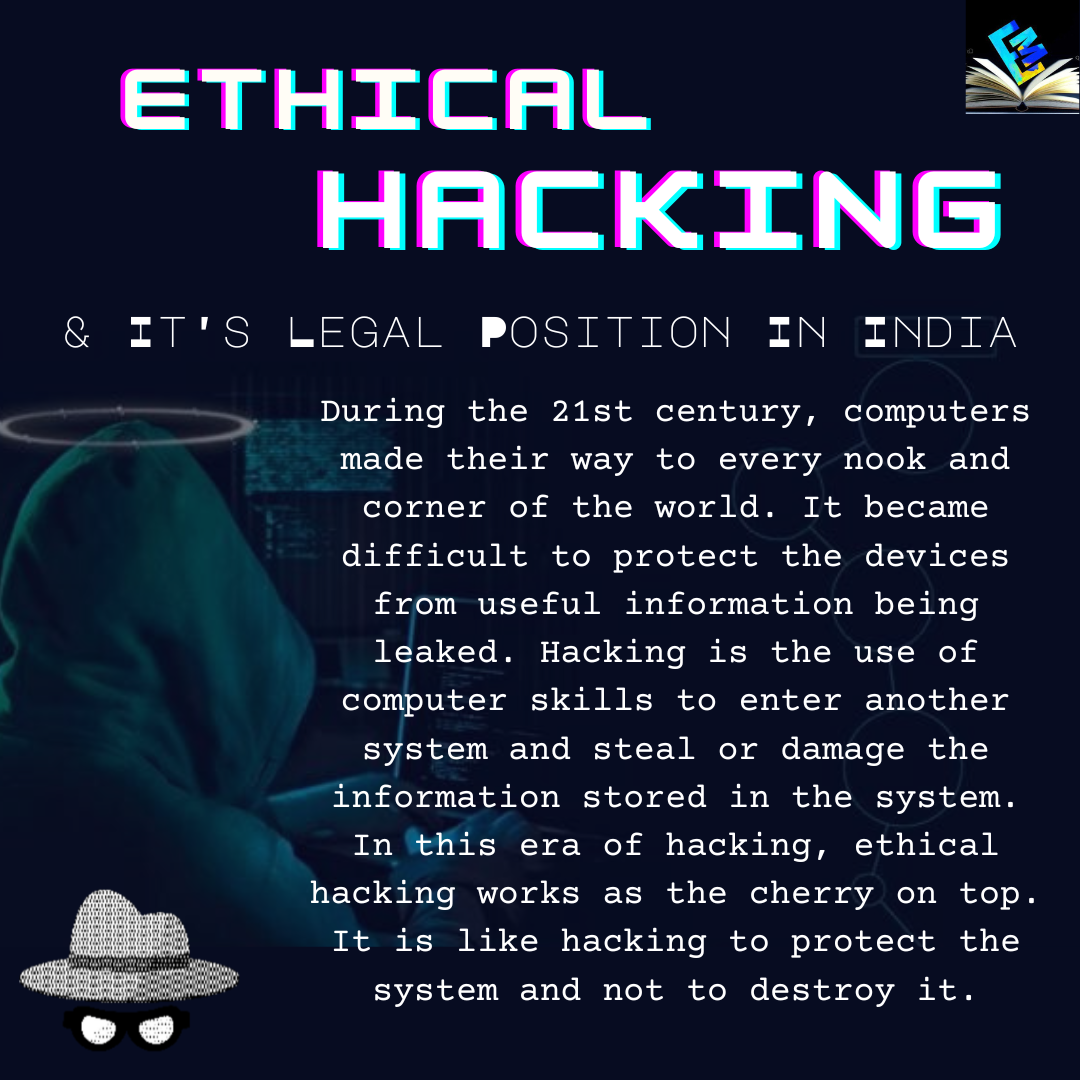
Ethical hacking and its legal position in India
keywords – ethical hacking, hacking, IT Act, Hacker
Written By – Laksheka Garg
Introduction
During the 21st century, computers made their way to every nook and corner of the world. It became difficult to protect the devices from useful information being leaked. Hacking is the use of computer skills to enter another system and steal or damage the information stored in the system. In this era of hacking, ethical hacking works as the cherry on top. It is like hacking to protect the system and not to destroy it.
Internet connected people globally. Through social media, most of our information could be misused. There are many ways in which hackers can easily steal the information with malicious intent, i.e. cookie theft, phishing, denial of service (DOS), etc.
Hacking is considered a crime, but there can be a good purpose for which hacking has to be done. It is termed as ethical hacking. Everything on the internet could be hacked depending on the skills of the hacker.
Ethical hacking and hacking
The term ethical hacking and hacking are quiet contrary. Hacking with ethical means protects your devices and the information they contain from being extracted or erased. Furthermore the information could be used to cause damage or wrongful loss to the victim.
Types of hackers
Black hat hacker – Black hat hacker causes damage to the system and extracts the information with the malicious intent. They extract personal information and use it illegally to make money or hack a website to use it for their own benefit. They steal the data unethically and manipulate it to be used against the victim
White hat hacker – White hat hacker has an authorised access to text bugs which detect the bugs for particular website or network. They are opposite of black hat hacker and is competent enough. This hacking is used to protect and provide security for the data. This is also termed as ethical hacking.
Grey hat hacker – Grey hat hacker is the mixture of white and black hat hacker. They look for the fault in the network and charge a fee to fix it. But sometimes it can be used with malicious intent to gain access to the data.
The black hat hacker enter to the data for some illegal purpose, the white hat hacker enters with the permission of the owner to protect the data from black hat.
Ethical hacking is used in various ways, like:
- Big firms used to hire ethical hackers for the protection of their own data. The majority of data for businesses is critical and can be abused. As the big firms face cyber threat and ethical hackers are known as cyber security experts.
- The government too faces cyber threats so they hire ethical hackers for the protection of data of national importance, which may cause harm to our nation’s security.
Legal aspects of Ethical Hacking
As the terms ethical hacking and hacking are not synonymous, hacking is a crime but it is not the same as ethical hacking. Ethical hacking is not being recognised by Indian legislation in straight forward manner. The ethical hacking does not involve mens rea, it has became need of an hour.
Some sections of The Information Technology Act, 2000 includes section that deals with cyber security:
According to Section 43 of the Act, any person who modifies, damages, disrupts, downloads, copies, or extracts any data or information from a computer or computer network without the permission of the owner or any other person in charge may be penalized for damages.
Section 43-A of the Act states that anyone who fails to secure data is liable for compensation; thus, if an ethical hacker works for a corporation and fails to protect the data under his control, he will be held liable for compensation under section 43-A of the IT Act.
Section 66 of the IT Act deals with computer-related offences and states that anyone who damages, copies, extracts, or performs any other action without the owner’s authorization will be sentenced to three years in prison.
The Indian IT legislation punishes a hacker who does not have proper authorization to get access to a computer, but it does not protect them unless they work for the government under section 84. Also, they must be taken seriously because their presence is critical in protecting computer networks from cyber terrorism and cyber-attacks, thus making ethical hacking legal.
A women claimed that her amount has been stolen from her bank account, ethical hackers helped her to get that money back.
Findings
• The data can be protected by the means of ethical hacking.
• The concept of ethical hacking is not widely introduced in our legislation.
• Ethical hacking became need of an hour as the usage of the internet has become convenient.
Conclusion
Since India is among the top three countries that faces cybercrime, the concept of ethical hacking became need of an hour .It is a legal way of hacking a networking system and has to work under some rules. As long as the governing rules are complied with, the act is justified. Furthermore, ethical hacking includes the permission of the owner of the system and that it is done in compliance with the law, which again strengthens the legality of the same.






